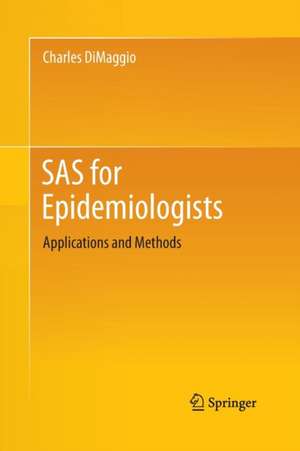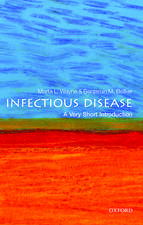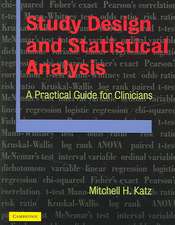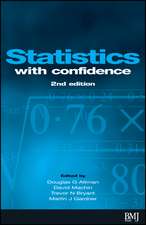SAS for Epidemiologists: Applications and Methods
Autor Charles DiMaggioen Limba Engleză Paperback – 23 aug 2016
SAS (Statistical Analysis System) is an integrated system of software products provided by the SAS institute, which is headquartered in California. It provides programmers and statisticians the ability to engage in many sophisticated statistical analyses and data retrieval and mining exercises. SAS is widely used in the fields of epidemiology and public health research, predominately due to its ability to reliably analyze very large administrative data sets, as well as more commonly encountered clinical trial and observational research data.
| Toate formatele și edițiile | Preț | Express |
|---|---|---|
| Paperback (1) | 583.13 lei 6-8 săpt. | |
| Springer – 23 aug 2016 | 583.13 lei 6-8 săpt. | |
| Hardback (1) | 730.35 lei 6-8 săpt. | |
| Springer – 25 oct 2012 | 730.35 lei 6-8 săpt. |
Preț: 583.13 lei
Preț vechi: 686.04 lei
-15% Nou
Puncte Express: 875
Preț estimativ în valută:
111.58€ • 121.58$ • 94.02£
111.58€ • 121.58$ • 94.02£
Carte tipărită la comandă
Livrare economică 23 aprilie-07 mai
Preluare comenzi: 021 569.72.76
Specificații
ISBN-13: 9781493942602
ISBN-10: 1493942603
Pagini: 278
Ilustrații: XVII, 258 p.
Dimensiuni: 155 x 235 x 15 mm
Greutate: 0.4 kg
Ediția:Softcover reprint of the original 1st ed. 2013
Editura: Springer
Colecția Springer
Locul publicării:New York, NY, United States
ISBN-10: 1493942603
Pagini: 278
Ilustrații: XVII, 258 p.
Dimensiuni: 155 x 235 x 15 mm
Greutate: 0.4 kg
Ediția:Softcover reprint of the original 1st ed. 2013
Editura: Springer
Colecția Springer
Locul publicării:New York, NY, United States
Cuprins
Introduction.- The SAS Environment.- Working with SAS Data.- Preliminary Procedures.- Manipulating Data.- Descriptive Statistics.- Histograms and Plots.- Categorical Data Analysis I and II.- Cleaning and Assessing Continuous Data using MEANS.- ANOVA.- Correlation.- Linear Regression.- Regression Diagnostics.- Solutions.
Recenzii
“The material in this text is based on aone-semester course for master’s level students in epidemiology and publichealth at Columbia University developed over the past several years by theauthor. The intent of the course is to enable students to be able to analyzeepidemiological data using SAS software, which is one of the most popularcommercial software products in use today across many sectors.” (Stephen J. Ganocy,Technometrics, Vol. 56 (3), August,2014)
Notă biografică
Dr. Charles DiMaggio is associate professor in the departments of anesthesiology and epidemiology at Columbia University’s College of Physicians and Surgeons and the Mailman School of Public Health. He is an injury epidemiologist whose work includes describing and analyzing the epidemiology of pediatric pedestrian injuries for the New York City Department of Transportation, establishing a surveillance program to track and explain the behavioral health effects of the terrorist attacks of September 11th, 2001 in New York, and investigating the developmental and behavioral effects of anesthesia on young children. He has an active interest in the application of epidemiological approaches to large data sets, and teaches introductory and advanced methods using the SAS and R programming languages. Dr. DiMaggio's previous positions include chief research scientist with the Nassau County, NY, Department of Health where he worked on a variety of projects including bioterrorism preparedness, syndromic surveillance, and health disparities, and as chief physician assistant and director of research for the emergency department at Mt. Sinai School of Medicine at Elmhurst Hospital Center in NY.
Textul de pe ultima copertă
This comprehensive text covers the use of SAS for epidemiology and public health research. Developed with students in mind and from their feedback, the text addresses this material in a straightforward manner with a multitude of examples. It is directly applicable to students and researchers in the fields of public health, biostatistics and epidemiology. Through a “hands on” approach to the use of SAS for a broad number of epidemiologic analyses, readers learn techniques for data entry and cleaning, categorical analysis, ANOVA, and linear regression and much more. Exercises utilizing real-world data sets are featured throughout the book. SAS screen shots demonstrate the steps for successful programming.
SAS (Statistical Analysis System) is an integrated system of software products provided by the SAS institute, which is headquartered in California. It provides programmers and statisticians the ability to engage in many sophisticated statistical analyses and data retrieval and mining exercises. SAS is widely used in the fields of epidemiology and public health research, predominately due to its ability to reliably analyze very large administrative data sets, as well as more commonly encountered clinical trial and observational research data.
SAS (Statistical Analysis System) is an integrated system of software products provided by the SAS institute, which is headquartered in California. It provides programmers and statisticians the ability to engage in many sophisticated statistical analyses and data retrieval and mining exercises. SAS is widely used in the fields of epidemiology and public health research, predominately due to its ability to reliably analyze very large administrative data sets, as well as more commonly encountered clinical trial and observational research data.
Caracteristici
Teaches readers to understand the concepts of model building within the context of linear regression Provides examples to conduct simple and stratified categorical data analyses in SAS and understand the concept of confounding within that context Promotes awareness of the role of logistic regression in epidemiology Includes supplementary material: sn.pub/extras Request lecturer material: sn.pub/lecturer-material













